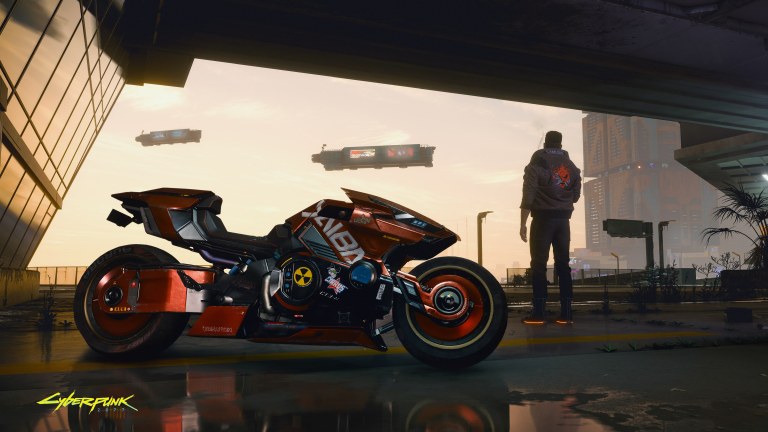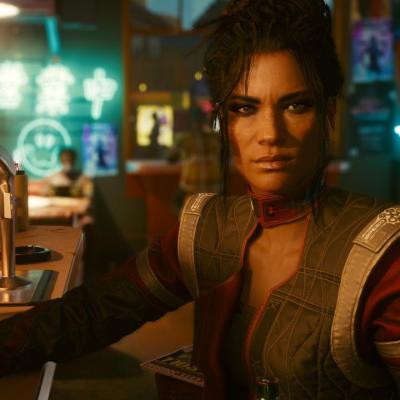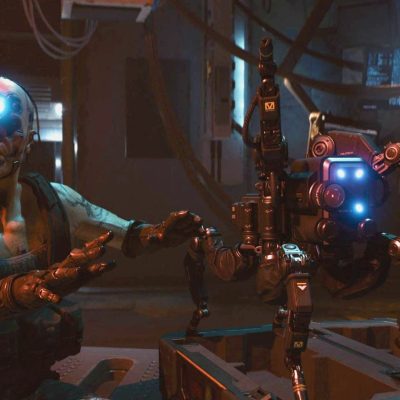Cyberpunk 2077 Review
Cyberpunk 2077's ambitious open-world is often a sight to behold on PC, but its gameplay isn't quite on par.

A preface: Cyberpunk 2077 has had one hell of a rocky release, and it’s almost impossible to play the game while also ignoring the controversy surrounding its disastrous console launch, among other points of contention. That being said, in my time with the game—which I reviewed on PC—I remained focused on assessing the game that was in front of me, period.
Cyberpunk 2077 is without a doubt a mixed bag, though its strengths ultimately outweigh its weaknesses. The game blew my hair back with its immersiveness, art and sound design, staggering scope, and production value (at least on PC). But its shortcomings are just as notable, although never catastrophic or deal-breaking. Gameplay has blemishes all over, the writing is tonally inconsistent, and bugs do mar the experience to a certain extent. This is far from a perfect game in its current state. But in spite of all this, part of me fell in love with the game for its ambition, boldness, and eye-popping presentation.
The story is set in the year 2077 in Night City, a Central California metropolis run by megacorporations, populated by millions of cybernetically-enhanced denizens, and poisoned to the core by deep-seeded corruption and crime. You play as V, a small-time crook who by seedy happenstance befriends another gun-waving lughead named Jackie. Together they take on a big-time heist that goes tragically wrong and results, impossibly, with the personality construct of a decades-deceased rockstar/terrorist named Johnny Silverhand (Keanu Reeves) implanted in V’s brain, chopping his remaining life expectancy down to a sliver. V and Johnny must work together to split their respective consciousnesses and take down the Arasaka corporation, whose borderline-demonic tech brought forth their doomed coexistence.
From this point on, you’re free to explore the city and get into all kinds of trouble. There are a multitude of slimy sleazeballs to meet, complete jobs for, and get into shootouts with, as well as all of the other side tasks you’d expect from an urban open world. You can buy/steal cars and motorbikes and use them to compete in street races, stumble upon police shootouts and join in on the action, or steal copious amounts of money and paraphernalia from warring street gangs. There’s A LOT to see and do in this game—the question is, is any of it fun?
The answer is complicated. In short, my answer is “mostly.” I find Cyberpunk 2077’s gameplay to be problematic at worst and, at best, reasonably fun. If the game didn’t look and sound so good, I don’t think I would have enjoyed the gameplay almost at all. I have yet to tire of playing Cyberpunk 2077, but I think that’s a testament to how much I love the audio-visual presentation and the characters, not the gameplay itself.
Before diving into the gnarled, twisted matter of gameplay, let’s get this out of the way: this game world is one of the greatest I’ve ever seen. Several studios have delivered amazing looking game worlds this year, but Night City is a serious design achievement that the folks at CDPR should be very, very proud of.
Looking up at the looming, almost monumental buildings that shape Night City’s skyline is breathtaking, but it’s what you see when your eyes come back down to street level that impressed me most. Trash bags piled up two stories high, plugging up alleyways with graffiti of cybernetic freaks scrawled across deteriorating walls. The environments are insanely detailed, but they tell a story, too: look up and you see big money, squeaky clean windows, and technological ambition; look down and you see a sea of sufferers, psychologically and physically wounded citizens bled dry in the name of corporate conquest. From a purely cosmetic perspective, the game looks phenomenal, but it’s the artistic intention behind the designs that really makes the visuals sing.
As far as technical prowess is concerned, the game is spectacular provided you have the right machine to run it. Texture quality is insanely high, the environments are absurdly detailed, and the game’s lighting, especially with ray tracing enabled, is incredibly realistic. The atmosphere in this game is as thick as I’ve ever seen, and combined with the game’s pulsating, evocative, synth-based score, it creates a mood that few other titles can rival. Simply taking a walk around Night City and soaking in the sights was my favorite thing to do.
The character models are another high point–from the detail of the models themselves, to the way they move, to the top-notch facial animation, every weirdo you meet in Night City is unique and expressive. An interesting thing I noticed was that during some cutscenes that I found to be banal from a narrative point of view were still captivating to a certain extent simply because the character animation and voice acting were so well done. Some of the writing is a little odd, particularly when characters who are meant to be thugs and grifters speak in an unusually formal tone, but overall, the voice actors and animators do enough to make the dialogue-driven moments engaging.
What I fear won’t be discussed enough about this game is its sound design, which is just as excellent as the graphics. Cyberpunk 2077 embeds you in its world better than any game I’ve played this year, and that sense of immersion can be largely attributed to the finely-tuned symphony of sounds that is constantly being streamed into your ears. From the squeaking of leather couches when you sit in them, to the muffled thuds you hear when you drive over speed bumps, to the way crowds sound in enclosed spaces versus outdoor spaces, the level of detail and care that went into immersing the player is incredible. The three-dimensional sound design actually makes the visuals appear more vivid and tactile than they actually are.
As for the gameplay, I found Cyberpunk 2077’s combat in particular to be clunky and a tad slow. It isn’t broken or imbalanced, but it isn’t snappy enough and there isn’t that x-factor that you find in most great shooters that keeps you obsessively coming back for more. To put it another way, The Witcher 3’s combat was so compelling and entertaining that I happily played that game for over 400 hours largely because of the combat. Cyberpunk 2077’s combat is absolutely not what pulled me through the game for the 60+ hours I played it, and there are many reasons why.
Release Date: Dec. 10, 2020
Platforms: PC (reviewed), PS5, XSX/S, PS4, XBO, Stadia
Developer CD Projekt Red
Publisher: CD Projekt
Genre: Action RPG
Combat is of the typical first-person shooter variety, with both shooting and melee combat supported. There are a slew of weapons to acquire and upgrade via the game’s crafting system, and the weapons all look and sound pretty sweet but are somewhat forgettable, which is a shame for a game boasting such a breadth of artillery. The “iconic” weapons, which you earn at different points throughout the campaign, stand out the most and come with useful perks. But none feel exciting to wield are pack the punch of Doom’s BFG or Half Life’s gravity gun. I did however enjoy the smart targeting feature you can access through a combination of smart weapons and a handy body mod, which allows your bullets to find their target no matter what direction you aim and can save your ass if you’re cornered and hurting behind cover.
Then there are the other two pillars of combat: hacking and stealth. Hacking allows you to wreak havoc on enemy tech to sabotage or distract them long enough to give you an opening to pounce guns-a-blazing. You can frazzle a baddie’s optics while you sneak up behind them, take control of all security cameras on a given network, or turn on a flood light to manipulate enemy movements. The possibilities are innumerable, and it all sounds great on paper.
But in practice the hacking system just isn’t all that fun to use. I was amused for a time, as I got increasingly more creative with how I used my scanner to tag enemies and objects and sabotage them from afar. But after a while this system became tedious because it slows down the action to an absolute crawl, and the tactical aspects of combat just aren’t polished or engaging enough to make up for the pause. In the later hours of my playthrough, I found myself almost always resorting to in-your-face combat because, well, it solved problems more quickly.
Stealth feels even shoddier than hacking, unfortunately. In most missions, there’s a big emphasis on taking your targets out quietly, but for me sneaking around almost always led to bouts of frustrated groans and eye-rolls. For one, enemies’ lines of sight are really difficult to gauge—some will spot you from seemingly a football field away, while others won’t notice you cross a walkway mere feet in front of them. On top of this, the window of opportunity you have to grapple enemies from behind is finicky—I’d be standing right behind a guy ready to grab him when suddenly the “grab” prompt would disappear inexplicably, when neither of us had moved an inch. I’d move in closer to try again and he’d turn around and…you know the rest.
I believe that if the stealth and hacking were more polished and refined, or even de-emphasized to a certain degree, it would free up the shooting to feel a lot more kinetic and exciting. As is, the combat grows old over time, which is a real shame when you think of The Witcher 3’s combat system, which is incredible and only gets sweeter as you play.
There is a whole litany of gripes I have with Cyberpunk 2077’s gameplay. The driving—be it on four wheels or two—feels slippery and unwieldy. The menus are an eyesore. Melee combat is atrocious. The “braindances”–investigative crime-reconstruction mini-games–are headache-inducing…I could go on. But there were other aspects of gameplay that I did enjoy, like the streamlined stash mechanic, the flexible crafting system, the number and variety of missions available at any given time, and most of all, the well thought out RPG elements.
The character progression system didn’t immediately strike me as anything special, but the more I played the game and explored the five skill trees (Reflexes, Technical Ability, Body, Cool, Intelligence), I found that the omission of a traditional class system actually makes character progression more fluid and encourages experimentation as opposed to nudging (or shoving) you down a particular path of mastery. Although I didn’t always enjoy enemy encounters, I did feel like the different perks I acquired helped me succeed in combat in ways that were easily measurable. For example, the “Vanishing Point” perk, which increases your evasion stat for seven seconds after you dodge if you’re dual wielding a pistol and revolver, totally changed the way I approached enemies. I quit stealthing for quite a while because darting around with my pistols blaring turned out to be super effective for me.
Generally, I did enjoy Cyberpunk 2077’s story and the fact that it’s more character-based than plot-based. The relationships between the characters take precedence over the machinations of the narrative, and I appreciate that. As in most RPGs, you meet characters and complete various tasks and quests for them, but with Cyberpunk 2077, I felt that the characterizations were so strong that I was actually more compelled to find out how the relationships between V and his supporting characters progressed than I was to collect precious loot at the end of missions.
I found all of the game’s characters to be memorable, which comes as no surprise considering the character work CDPR has done in the past. Rogue nomad Panam can be both compassionate and vicious; the dutiful Goro Takemura is almost comically stoic and serious; Jackie’s tight relationship with his family and friends permeates the game in a poetic way. And Reeves does a fine job as Johnny Silverhand, though his style of voice acting took a bit of getting used to for me, particularly when compared to the rest of the cast.
The nice thing about V’s relationships is that the more you explore the city and the more characters you meet, the more possibilities open up to you in the campaign’s final act. There are a multitude of endings that you can reach, but these outcomes are largely dictated by the people you’ve met and how close you are to them.
What irks me about the game’s last act is how it plays out leading up to the ending. After playing for hours and hours in the beautiful game world that is Night City, I was expecting to be treated to even more imaginative environments and enemy encounters at the game’s conclusion. Without spoiling anything, the final enemy encounters and environments are almost laughably unimaginative and generic, and that was a big letdown.
I indeed experienced bugs during my time with Cyberpunk 2077, but far less than I’ve seen for other platforms online. A couple of crashes and a slew of visual glitches definitely cropped up for me, but they didn’t color my experience nearly as much as the game’s positive traits did, particularly in the visual department. The bugs that bothered me most were the ones that affected the narrative, like when dialogue options would be missing or when characters’ voices would drop out inexplicably. But overall I had a relatively smooth experience that was no more buggy than your typical open world game.
My relationship to Cyberpunk 2077 is a fraught one. I have so many issues with this game that I couldn’t possibly fit them all into this review. And I have just as many positive things to say. The grandeur of the project is both what I love and hate about it. I do wish CDPR had tightened its focus and worked out some of the game’s more glaring issues before rushing Cyberpunk 2077 out for a holiday release. But at the same time, I deeply respect the scope of the studio’s vision. This is a game with a strong sense of identity, and that’s something that you can’t say about a lot of AAA open-world games these days.
Cyberpunk 2077 is problematic, but ultimately I’m a fan of it in spite of its flaws. And I think in time its flaws will be ironed out and my fandom will only grow.


